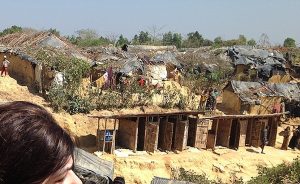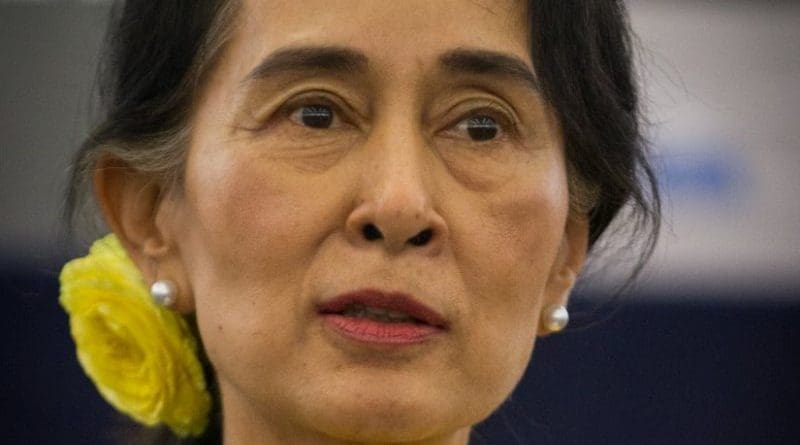Burma: Suu Kyi Slams ‘Disinformation’ As Information War Intensifies
By IDN
By Kalinga Seneviratne
The information war on Myanmar’s Bengali/Rohingya problem has intensified as Myanmar’s de-facto leader and Nobel Peace Laureate Aung Sung Suu Kyi finally broke her silence on the issue on September 6 and slammed the international media and human rights organisations for spreading “misinformation” on the conflict.
One day earlier, the London-based Burma Human Rights Network (BHRN) launched a report in Bangkok bashing Myanmar’s Buddhist majority. The following day India’s Prime Minister Narendra Modi making his first official bilateral visit to neighbouring Myanmar pledged Indian support to fight cross-border Islamic terrorism.

The Myanmar government information committee said that gunmen affiliated with the Islamic terrorist group of the Arakan Rohingya Salvation Army (ARSA) invaded villages in Maungtaw Township in the Rankin state over the weekend and set fire to hundreds of houses. After clashes they have discovered a number of explosive devices and another 80 houses burned in neighbouring townships. The government has put the blame on this carnage on the ARSA a terrorist group of Rohingya refugees believed to be trained in Pakistan and funded by Wahabbi sources in Saudi Arabia.
Meanwhile, BHRN in launching their report on September 5 at a media conference in Bangkok claimed that there is a “systematic persecution of Burma’s Muslim minority” with ID cards denied to them, constant monitoring of their mosques and young people across the country, spread of “Muslim Free” villages and of course military attacks on Rohingyas in Rankin state leading to the exodus of thousands of refugees across the borders mainly to Bangladesh.
The so-called “discrimination” against Muslims listed in the report was almost identical to what Muslim minorities are having to cope with in western countries, but, the report constantly referred to “Buddhists” as perpetuators whereas when such discrimination is reported in the West it will be addressed as a national security issue rather than “Christians” as perpetuators.
What the Myanmar government is complaining about is this double standard. That they are facing a terrorist threat from IS-linked ARSA. But, Human Rights Watch (HRW) Deputy Director for Asia, Phil Robertson argued during the media conference that they have monitored the “carnage” via satellite images from Bangkok and showed such images where the red dots shown he claimed were Rohingya houses burned by the army. When pointed out by a journalist that the Myanmar government claims that Rohingyas themselves are setting fire to houses, all he could say is “oh, this is Burmese government propaganda”.
After the UN Secretary-General António Guterres has warned of ethnic cleansing and regional destabilization and in a rare letter to the Myanmar government has talked of a spiral of a “humanitarian catastrophe”, Aung Sung Suu Kyi finally broke her silence on the issue on September 6 and blamed “terrorists” for “a huge iceberg of misinformation” on the violence in Rakhine state, but did not address the issue of fleeing refugees.
In a statement issued by her office on Facebook, Suu Kyi said the government had “already started defending all the people in Rakhine in the best way possible” and warned against misinformation that could mar relations with other countries. She referred to images on Twitter of killings posted by Turkey’s deputy prime minister that he later deleted because they were not from Myanmar. Earlier Suu Kyi had spoken by telephone with Turkish President Tayyip Erdogan.
She said in the statement that “(such) kind of fake information which was inflicted on the deputy prime minister was simply the tip of a huge iceberg of misinformation calculated to create a lot of problems between different countries and with the aim of promoting the interests of the terrorists.”
The UN estimates that over 125,000 – most of them women and children – have fled across the border to Bangladesh. There are about 1.1 million Rohingyas in Myanmar whom the locals call Bengali because they believe most of them are illegal immigrants from Bangladesh. But, human rights campaigners point out most have lived there for a number of generations. BHRN said in their report that Muslims have to provide documentation that proves a family lineage dating back to before 1824 to gain Myanmar ID cards.
While reports in the Myanmar media said that attacks by ARSA terrorists on “Bengali villages” continue. Mizzima news – which won a ‘free media pioneer” award from the International Press Institute in 2007 – reported on 5 September 5 that Indian and Bangladesh intelligence officials have disclosed they have intercepted three long duration calls between Hafiz Tohar, military wing chief of ARSA on August 23 and 24 that hold the key to why the militant group unleashed the pre-dawn offensive against Myanmar security forces.
The report said that Tohar has been trained in Pakistan by Lashkar e Tayyaba and while Bnagladesh government is also worried about these terror links, a lack of intelligence sharing network between India, Bangladesh and Myanmar may have prevented the latter from getting prior warning on the threat.
During his visit to Myanmar concluded on September 7, Modi told Suu Kyi that he wants to see a peaceful border between India and Myanmar and offered Indian cooperation in the area of security. “We are partners in your concerns over the loss of lives of security forces and innocent people due to the extremist violence in Rakhine State. Our interests in the area of security are common as neighbours. It’s essential that we work together to ensure the stability of our long territorial and coastal borders,” Modi said during the joint media briefing with Suu Kyi in Myanmar’s capital Nay Pyi Taw on September 6.
While there have been public demonstrations by extremist Islamic groups in Malaysia, Indonesia and Bangladesh, the governments have been playing a behind the scenes quiet diplomatic role to defuse the situation knowing very well how religious passions could have a negative impact on ASEAN (Southeast Asian Nations) community building process. All three Muslim neighbours of Myanmar practice a very moderate form of Islam compared to its Middle Eastern counterparts, and this issue has the potential to empower the smaller extremist groups in their countries.
The same applies to the Buddhists in Myanmar, where the Myanmar government has been closely monitoring the Association for the Protection of Race and Religion — usually referred to by its Myanmar-language acronym, Ma Ba Tha, which is viewed by many of its supporters as a broad-based social and religious movement dedicated to protecting Myanmar’s Buddhist identity and heritage, as well as empowering poor Buddhist communities at a time of unparalleled change and uncertainty in the country.
Millions of Buddhists across the country also face same economic hardships the Rohingyas are supposed to be facing. Statistics released from 2014 census indicate that the number of homeless across the country have reached almost 1 million and tremendous housing deprivations exists across the country.
The International Crisis Group, a Brussels-based think tank, said in a report on “Buddhism and Politics in Myanmar” that the crisis triggered by Rohingya insurgent attacks and massive retaliation by the army has boosted anti- Muslim sentiment nationwide.
“While dynamics at play in Rakhine are mostly driven by local fears and grievances, the current crisis has led to a broader spike in anti-Muslim sentiment, raising anew the specter of communal violence across the country that could imperil the country’s transition,” warned the ICG report. It added that a failure by the civilian government of Aung San Suu Kyi to come to grips with economic inequality and provide adequate public services such as education, access to justice and disaster relief would allow Ma Ba Tha to gain legitimacy.

